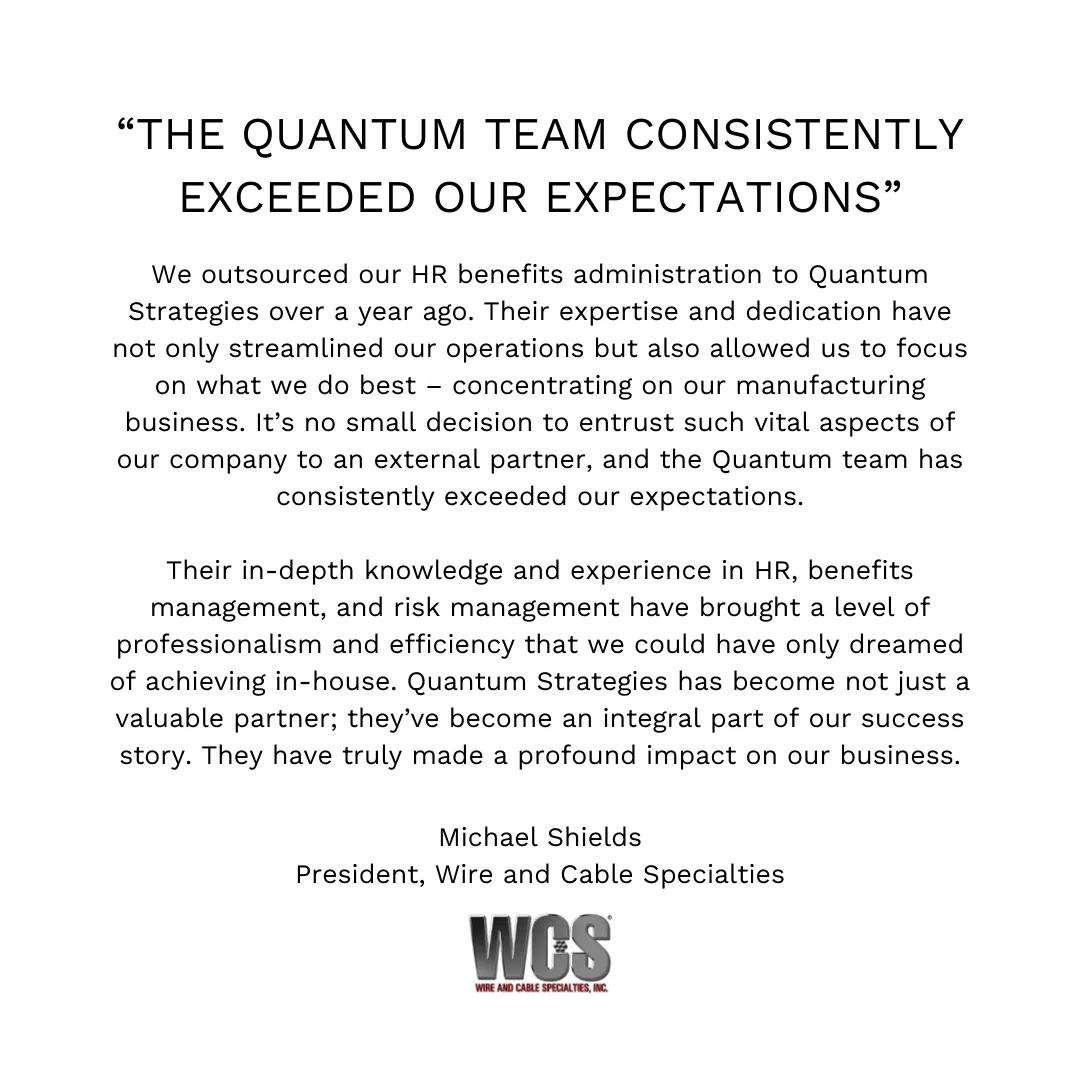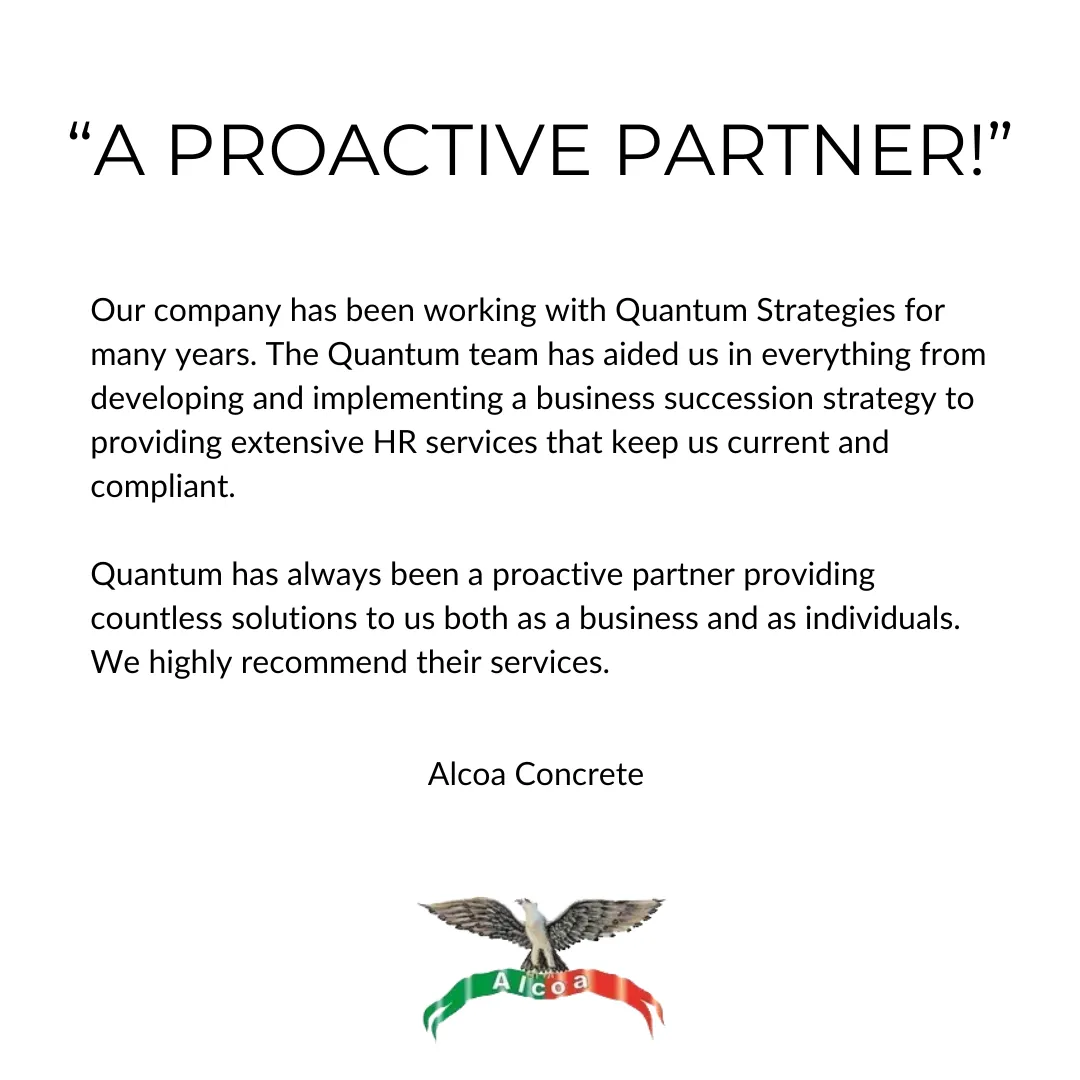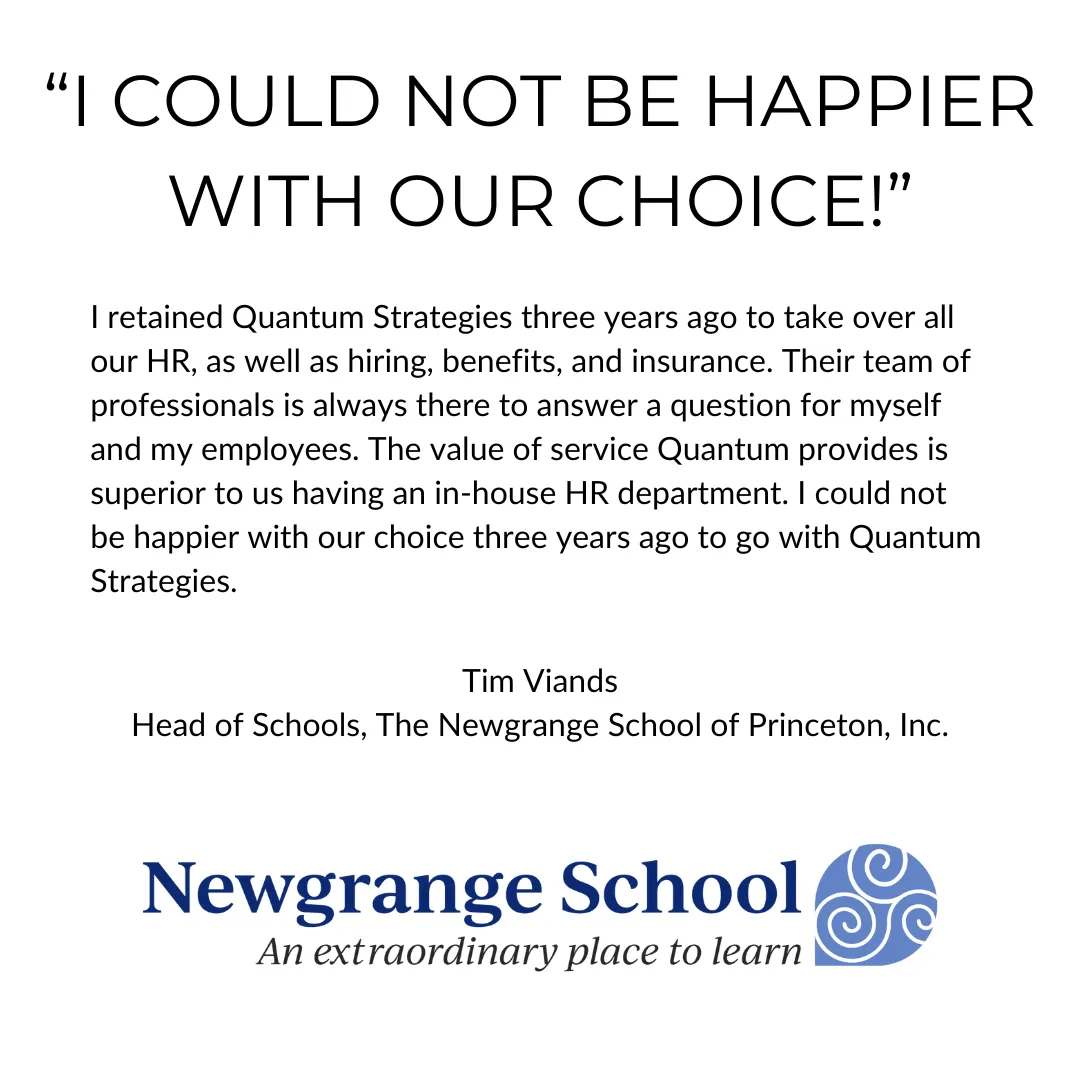Tailored HR Solutions as Unique as Your Business
Expert consulting and service to elevate your HR from a headache to a value driver.
Does Your HR Function Make the Grade?
Take our 5-minute quiz and evaluate the effectiveness of your HR function.

How We Help
We Focus on Your HR Needs,
So You Can Focus on Your Mission.
At Quantum Strategies, we understand that effective human resource management is the cornerstone of every successful business, regardless of size. Our mission is to provide tailored HR solutions that align perfectly with your unique business needs and growth stage.
Our Services
Navigating Change with Confidence: Quantum Expert HR Solutions
From Policy Assistance to Leadership Succession Planning, Quantum Strategies is Your Ultimate HR Resource to Solve Your Business Challenges.
HR Operational
Assessments
Unlock the full potential of your HR department. Our collaborative approach brings clarity and efficiency to your HR operations, providing a thorough analysis of your department's structure, costs, effectiveness, and needs.
Comprehensive Analysis: Detailed evaluation of your organization, workgroups, and individual roles for optimized efficiency.
Objective Insights: Receive a clear blueprint highlighting your HR department's strengths, weaknesses, and gaps.
Strategic Recommendations: Actionable plans focusing on technology utilization, communication enhancement, and leveraging department strengths.
HR Consulting and Managed Services
Tailored to align with your unique needs, our HR consulting and managed services enhance operational efficiency and effectiveness, allowing you to focus on your core mission while we optimize your HR investment.
Expert Supplemental Support: Strengthen your existing HR team with specialized expertise to navigate complex HR landscapes.
Personalized, Agile Solutions: Customized services for organizations with or without HR teams, adaptable to your specific requirements.
Goal-Oriented, Clear Communication: Delivering precise, actionable strategies that align with your organization’s goals and ensure successful execution.
Custom HRIS Design and Integration
Revolutionize your HR data management. Our team will evaluate your current human resources technology stack, offer recommendations, and then integrate your new and existing systems with our cutting-edge technology, ensuring seamless data flow and optimized operational efficiency.
Seamless Integration: Connect legacy systems with modern platforms for streamlined data management.
Tailored Design: Custom HRIS solutions uniquely crafted to meet your specific business needs.
Advanced Analytics: Leverage data-driven insights for strategic decision-making and operational excellence.
“Successfully steering through the specialized HR challenges within organizations of all kinds demands expert understanding, strategic planning, and precise implementation. With comprehensive knowledge of these challenges and the right solutions, your business can stay focused and successful in their vital missions.”
William J. Rizzo

Who we Are.
We Focus on Your HR Needs,
So You Can Focus on Your Mission.
At Quantum Strategies, we recognize that proficient management of human resources is fundamental to the success of any enterprise, irrespective of its scale. Our objective is to deliver customized human resource solutions that are in perfect harmony with your distinct business requirements and developmental phase.
Constant Improvement
Commitment to Customers
High Level Of Knowledge
Best Service You Can Get

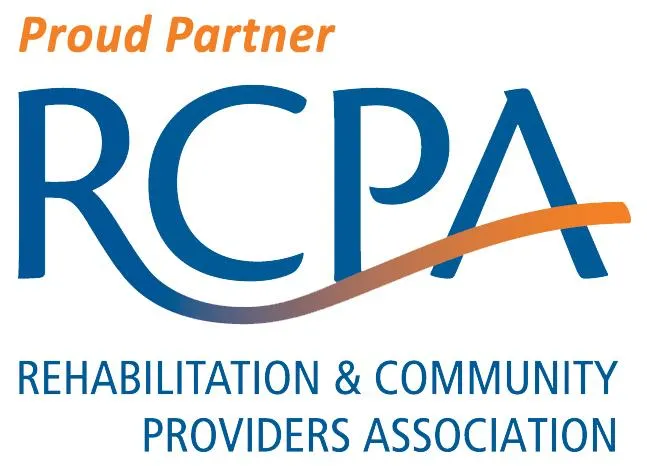
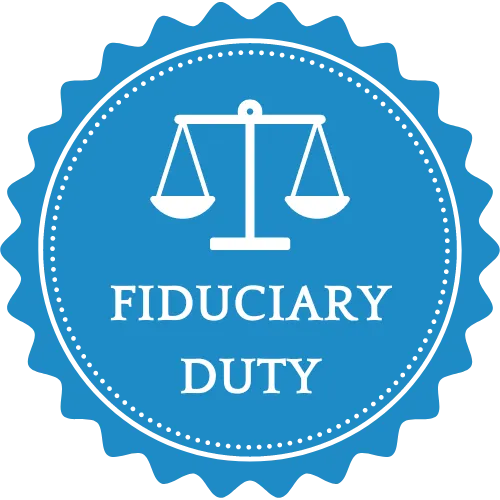
Why Choose Us
A True Partner to Solve Your Most Complex HR Challenges.
Empowering HR Innovation and Compliance
Commitment to 100% Client Satisfaction
People-First Approach

Peace of Mind:
Handle ongoing compliance with ease

Employee Satisfaction:
Build a positive workplace with engaged employees

Strategic Confidence:
Drive strategy with advanced analytics

Leadership Development:
Equip your team with the tools to lead

2,245 +
Happy Clients

25 +
Years Of Experience

120 +
Professional Team
Testimonials
The Quantum Commitment - 100% CLIENT SATISFACTION!
At Quantum, we understand that your satisfaction matters most, and The Quantum Commitment is our way of putting that understanding into action. Experience the difference with a team that is dedicated to making your satisfaction the cornerstone of our service. Because when you choose Quantum, you choose excellence, reliability, and a commitment to exceeding your expectations every time.
Our Resources
Unveiling Proven Strategies and Insights.
Discover actionable tips, expert advice, and industry insights to fuel your journey towards success.

Fostering a Psychologically Safe Workspace
As we navigate the complexities of the post-pandemic world, the importance of mental health in the workplace has surged to unprecedented levels. According to research from the
American Psychological Association, 81% of employees are now actively seeking workplaces prioritizing mental well-being.
Key Challenges Faced by Human Resources in Nonprofit Organizations
The nonprofit sector brings its own set of specialized difficulties, especially in the area of human resources (HR). Although these difficulties may share some common ground with those in the for-profit industry, they possess unique characteristics that require special attention from nonprofit leaders.
FOUND THESE HELPFUL?
Explore Additional Articles and Resources In Our Blog

The Transformation of HR: Past, Present, and Future
Introduction
Today's Human Resources (HR) landscape continues to evolve and become more instrumental in the success of businesses of all sizes. Human Resources as we know it today began in the late 18th century during the Industrial Revolution as a response to the complex labor relations and workforce management needs arising from the shift to factory-based production and the growth of large-scale industrial enterprises.
Since its humble beginnings, the roles and responsibilities of human resource departments have evolved at an increasing rate, forcing HR professionals to adjust their strategies to keep up with employer-employee relations continually. Today, we are seeing a shift in the understanding of HR from an administrative function to a strategic business driver that will continue to play a crucial role in the success of all organizations with data-driven analytics and new technologies.
As businesses continue to evolve, HR strategies evolve with them. Understanding your employees' changing needs and preferences and adapting your HRM strategies and processes is essential to stay ahead in an increasingly competitive business landscape. Along with new innovative solutions, the future of HR also presents many new challenges that HR professionals must tackle to ensure success now and in the future. In this blog, we will discuss the past, present, and future of HR.
The Origins of Human Resources
Before the Industrial Revolution, labor was overwhelmingly agricultural, and employment relationships were personal and small-scale. Many farmers worked for themselves, family members, or neighbors. The Industrial Revolution brought on the growth of factories, and mechanization shifted the employer-employee relationship. Work was conducted in factories employing large numbers of workers who might never meet the owner of the company.
During the Industrial Revolution, there was a transformational shift in the nature of work and the workforce due to a shift from agrarian to industrial economies. New technologies led to the emergence of mass production and the beginning of large-scale industries. All these changes made leaders rethink strategies about work environments and the employee-employer relationship.
During this period, the initial emphasis of HR depended on labor relations and personnel management. Business owners dealt with this new large-scale production by coordinating the now larger workforce with specialized tasks, but more personnel management was needed. At the time, the workforce was evolving fast, and to keep up, organizations created personnel departments designed to recruit, train, and manage employees. Business leaders realized the importance of aligning HR practices with organizational goals, leading to a strategic HR approach.
Strategic HR evolved even further with a new emphasis on employee engagement and organizational culture. The Industrial Revolution sparked the rapid evolution of strategic HR, from personnel management to more strategic HR functions used to drive a business's success in an ever-changing environment.
HR in the Present Era
From their beginnings in the Industrial Revolution, HR strategies continued to evolve towards the present era, focusing on organizational success. HR now plays a crucial role in both talent acquisition and retention. Job markets are becoming increasingly competitive, making it more critical for HR professionals to attract and retain top talent. HR professionals retain by fostering an environment that encourages professional development and long-term commitment. A central principle in modern HR embraces diversity and inclusion in the workplace. HR departments now strive to build inclusive teams that foster diversity and innovation and create a more dynamic work environment.
Modern HR focuses on organizational culture and employee engagement. HR professionals actively shape and sustain a positive workplace culture to retain talent and keep their employees engaged by prioritizing well-being, open communication, and career development. Succession planning, for example, is a modern strategic function that helps the employee and employer drive complete organizational success. It allows the employer to evaluate their organization, give promotions, and further understand their employees' different talents and needs, allowing employees to develop the skills they need to grow professionally and within the organization.
Digital transformation has also brought a significant shift in Human Resource Management. HR embraces technology and analytics to streamline processes and make data-driven decisions on workforce trends.

Emerging Trends In HR
As HR strategies evolve into a new era, let's look at some of the newer cutting-edge trends in the space that could likely shape the future of HR. Artificial Intelligence (AI) has been a game-changer across all industries and job functions, including HR, automating and streamlining routine administrative tasks. AI's efficiencies and time savings enable HR professionals to further their position as strategic business drivers. Technology has optimized several traditional HR functions, including recruiting through AI-driven resume screening, automatic time-keeping and payroll administration, and more.
This new era of HR also shifted a focus on employees' work-life balance. In today's world, the line between personal and professional life is more blurred than ever; HR professionals have taken the initiative to prioritize a comfortable work-life balance for employees. Employers now recognize that a healthy and satisfied workforce helps with retention and fosters innovation in the workforce.
More and more organizations are implementing policies that promote flexible work arrangements and offer well-being packages to support their employees' physical and mental well-being, creating a supportive environment that nurtures personal and professional growth.
New technologies and ideas have also led to the role of HR in promoting organizational agility and innovation. For example, employee engagement systems give employees a platform to receive recognition for their success, connect and collaborate with other employees, and offer points for employees to redeem with awards. Performance management systems are also a new trend in this space, enabling managers to set and track goals for their direct reports more efficiently, conduct quarterly or yearly performance reviews, and create performance improvement plans for employees who need to catch up to their goals.
These systems give businesses access to integrated data that can be used in unison to analyze trends and make data-driven decisions. HR professionals drive organizational agility by creating a continuous learning and improvement culture to foster cross-functional collaboration between departments. Adapting to market trends and new technologies positions your organization toward consistent and sustainable growth.
Challenges and opportunities for HR
The modern HR landscape has provided innovative solutions for employers worldwide but has also brought challenges. The COVID-19 global pandemic has driven a significant rise in remote work, redefining the workplace and creating new challenges for HR professionals.
Employers with remote work employees must innovate their approach to employee engagement, collaboration, and performance management. HR professionals must play a pivotal role in ensuring remote work teams stay connected, productive, and motivated, fostering effective communication in a virtual environment. It also gives employees a sense of belonging even while not physically in the workplace. Along with remote work, employers are finding it increasingly difficult to navigate the ever-changing world of legal compliance. HR professionals must navigate myriad legal and ethical considerations that constantly change. Today, employers must also navigate the complex compliance landscape, including labor laws and diversity and inclusion regulations, and address ethical concerns in HR practices.
Lastly, HR professionals leverage data while maintaining a human touch. Although the influx of technology has given HR departments tools to make data-driven decisions, maintaining a human element within your HR practices is a new challenge. HR professionals can keep their human touch while leveraging analytics and technology by maintaining a human-centric approach. They can do this with empathetic and open communication and create a personal connection with their employees. Automated technology can be great for streamlining HR, but at the same time, HR professionals have to balance it with a human touch for the sake of organizational health. Although HR professionals face many new challenges today, they can navigate them by evolving their approach.
Conclusion
From the Industrial Revolution to now, HR has evolved rapidly. There was a new need for HR in the Industrial Revolution, and its functions expanded as large businesses needed internal management. Presently, HR has become a staple strategy for every company. More emphasis has been put on recruiting strategies, monitoring employees' happiness, increasing retention space, and creating a collaborative and open work environment. Laws and industry trends constantly change, and to have a cutting-edge HR department, HR professionals need to study and continuously adapt their HR strategies to keep up with the competition. The future looks bright for HR; with new technologies to leverage, organizations can streamline and automate redundant HR tasks to focus more on strategic functions. The future of HR will also provide more challenges that can be navigated by keeping up with trends, valuing employee health, and creating an open work environment that employees value. Starting with only personnel management, HR has evolved to leverage the industry's newest technologies. It will continue to change in the future.
HR professionals must continually adapt to the ever-changing environment to ensure success. As HR develops into the future, it will become increasingly more important to use it as a strategic function of your organization.
Connect
Keep Up with Our Latest News and Insights
Subscribe to Quantum Strategies' latest updates and insights.
Office: Philadelphia, PA | Glen Mills, PA | Washington, DC
Call 610.624.1770
Email: info@QS2500.com
Site: www.QS2500.com

